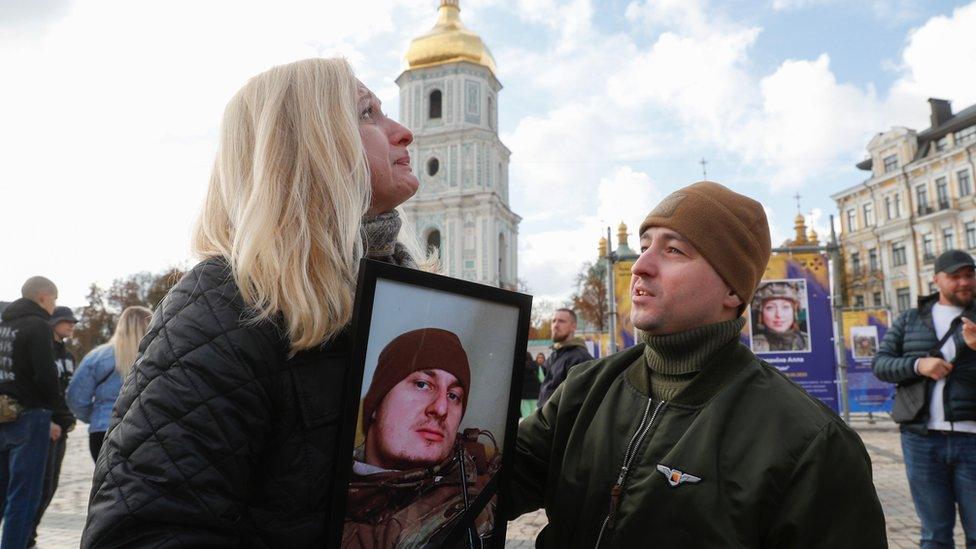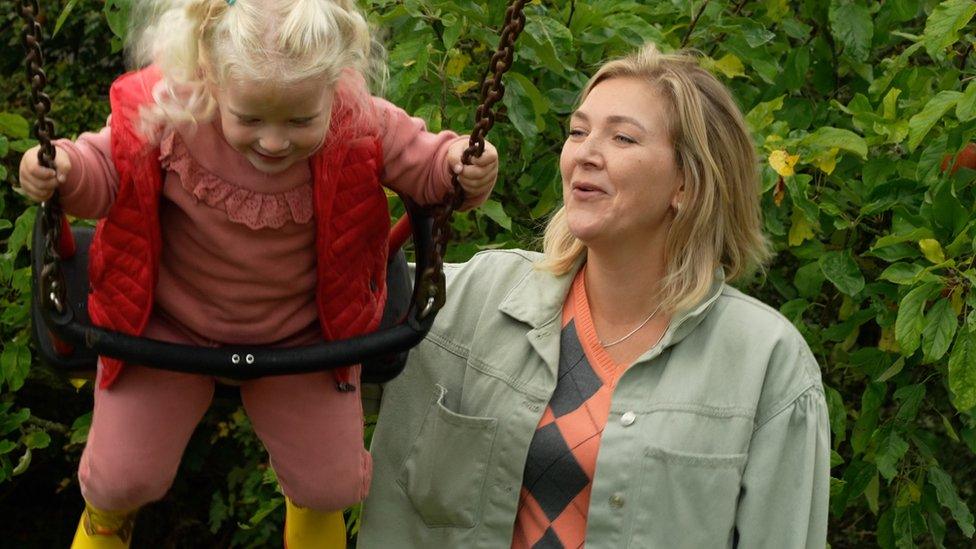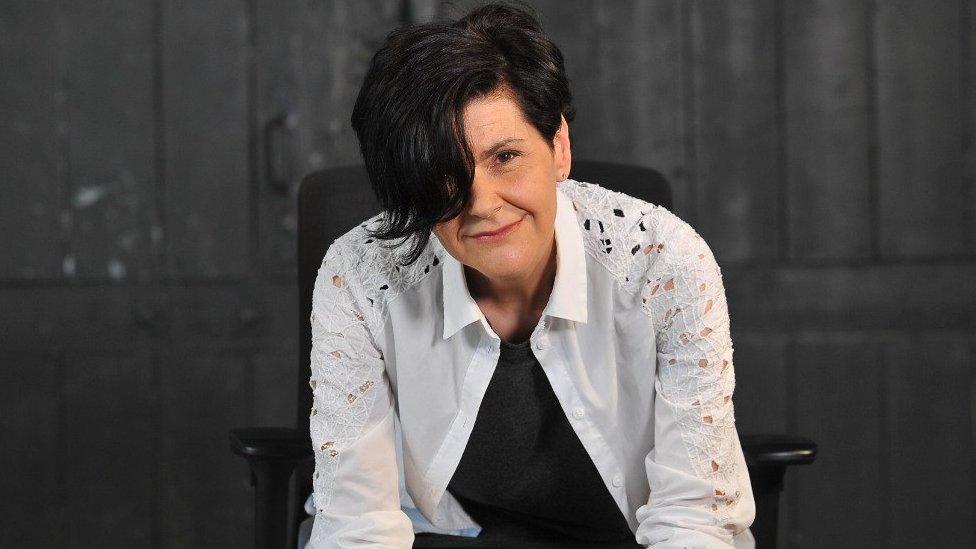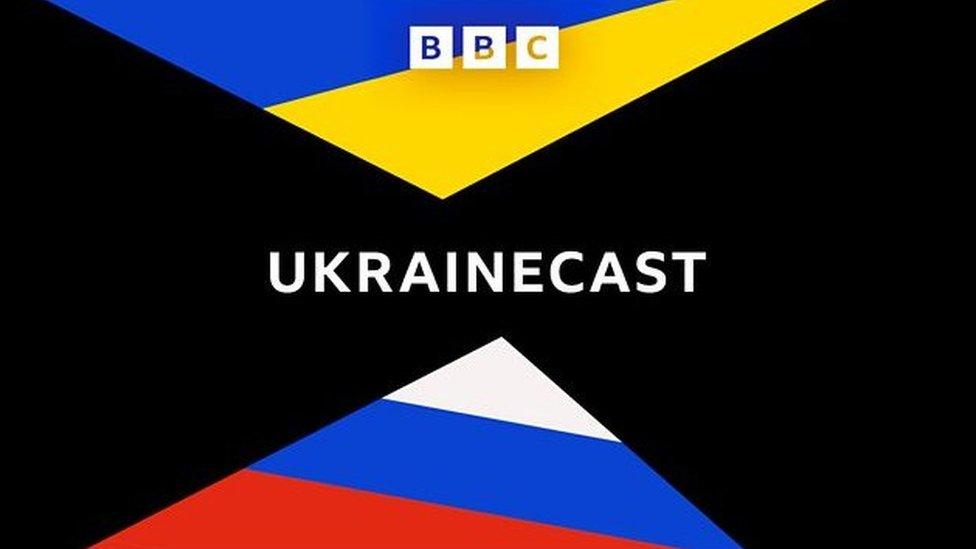Ukraine war round-up: Putin 'has no regrets', and joining the 'huge vibe'
- Published

Natalia reacts as she holds a portrait of her lost son at a military commemoration in Kyiv on Friday
After 233 days of war in Ukraine, which have left tens of thousands dead or injured, Russian President Vladimir Putin has tried to defend his invasion - saying he has "no" regrets.
"What is happening now is not very pleasant, to put it mildly, but we would have got exactly the same a bit later, only at worse odds for us," he told journalists on a visit to Kazakhstan.
He tried to justify the invasion by pointing out that Ukraine had blocked the canal supplying water to Crimea, which Russia annexed from Ukraine in 2014.
"Two-and-a-half million people live in Crimea..." he said. "They [Ukraine] went and cut off the water there. The troops had to go in and turn on the water to Crimea."
He denied wanting to destroy Ukraine as a state and said he saw no need for now to continue mass missile strikes like those carried out on Monday.
Mr Putin had earlier said said the strikes were retaliation for the attack on Russia's massive road and rail bridge to Crimea. On Friday, it was announced that repairs to the bridge would take until next July to complete.
Ukraine has stepped up calls for the Red Cross to visit its troops held prisoner in the annexed region of Donetsk.
Andriy Yermak, the Ukrainian president's chief of staff, demanded the Red Cross visit Olenivka prison within three days. However, the organisation said it could not inspect the facility without permission from the other side.
Fewer missiles
Some experts have questioned whether Mr Putin even has the weapons to repeat air mass attacks on Ukrainian infrastructure, saying they believe Russia's weapons supplies are running low - especially of up-to-date, precision missiles.
Rescuers arrive at destroyed residential building in Ukraine
They have pointed to Russia's use of surface-to-air missiles to hit land targets as an indication of a shortage of more suitable munitions.
"The most notable thing in [recent attacks] is the increased use of a variety of missiles against land targets," says Douglas Barrie, a military expert at the International Institute for Strategic Studies.
Sir Jeremy Fleming, head of the British intelligence agency GCHQ, is more to the point: "Their supplies and munitions are running out."
Dreading another move
The Russian president's invasion sent refugee numbers soaring, with nearly eight million now recorded across Europe, external - including Russia itself.
But the nearly 30,000 Ukrainians who have called the UK home for almost six months are facing a looming crisis as their initial hosting arrangements come to an end.
Anna Semenenko, 40, and her two children, aged three and 13, have been living with a retired couple from Oxfordshire, Jane and Nick. "I feel very guilty talking about the end of hosting because the heart wants to help," says Jane.

Anna Semenenko hopes that she can stay local so that her children remain in their current schools
Anna is anxious about the effect on her children if she cannot find alternative accommodation.
"There is a difficult journey ahead of them, they don't have roots," says the trained mathematician from Donetsk. "And another change would be a blow for them."
Part of a huge vibe
Since Russia's invasion, people across Ukraine have got used to spending part of their lives in bomb shelters.
But two Ukrainian DJs have made a virtue of necessity by using them to play shows.

"I would like to say that music helps the military to be strong and keep fighting," Viktoria says
They will now feature in Europe's Biggest Dance Show line-up.
The marathon broadcast, involving 11 radio stations across 10 countries, will return to BBC Radio 1 later.
For Viktoria Polchenko, from Ukraine's Radio Promin in the capital Kyiv, it will mean a little bit more than just a party. Music has the power to act "like a lifeline that helps us be strong and hold on", she told BBC Newsbeat.
Ukrainecast

After the Russian-installed leader of Kherson called on local residents to evacuate and "save themselves", the latest episode of the BBC's Ukrainecast explores life under occupation in the region.
Victoria Derbyshire and Vitaly Shevchenko also speak to a lawyer working for the Russian human rights organisation Memorial, which was just awarded the Nobel Peace Prize. Tamila Imanova explains why she agrees that Russian people should bear collective responsibility of the war, but warns against the risk of Russophobia.
And former NATO adviser and political risk consultant Samantha De Bendern answers questions from listeners about Ukraine's military position, after a week of heavy bombardment.
Finally, Victoria and Vitaly hear from Iuliia Mendel, President Zelensky's former press secretary, about his only meeting with President Putin in 2019.